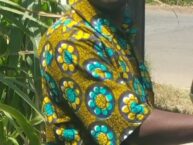Zimbabwean winters are conceited.
One minute your hands are forming tight fists into your pockets burrowing past coins, notes and forgotten scraps of paper in pursuit of elusive warmth. And the next, a full sun is laughing haughtily into your face, making you sweat and take off your layers, making you unfurl your fists and spread your fingers into a loose fan with which to shield your eyes from the shock.
Pretentious. Self-indulgent. Just like Garikai.
Sometimes his name floats all over the page I’m reading, like a game of scrabble playing itself. Methodically, the game picks letters from different sentences and paragraphs and begins to construct him, character by character.
At times I see him in deviant clouds hovering overhead creating fleeting artworks in his hand, or in mundane city scenes that he would depict so differently.
Everywhere. Nowhere. Sometimes here. Sometimes not.
The kombi jerks forward, rattling my thoughts, making my book spill out of my hands. Quickly, I recover it, fold a corner into the bottom right page and then return it into my bag. The tout with the stale beer breath hands me 5 Rand worth of coins as change for the washed out US dollar note I have just given him. The coins are moist and warm and I quickly drop them into my jacket pocket, there where my fists will nest when the weather necessitates.
The news on the hour booms through gaudy speakers. It is read by a woman with a radio voice that sounds like glass heated and blown into a sonorous drinkable shape.
The headlines.
Something about ZIM ASSET is mentioned, but I fail to drink it in.
ZIM ASSET is for Zim Asses, fat cats who riddle off policies they have no intentions of implementing. Someone once said that to me. I agreed.
I wonder how many people know what ZIM ASSET actually stands for. Like I wonder who knew that BACOSSI was actually a fiscal policy back in the pathos of 2008, and not some slang word for things sold at a discounted price like we misused it.
BACOSSI airtime. BACOSSI sweets. BACOSSI lives.
Leading story. June 27 2014.
After 16 days of non-stop exhilarating football, it is the first rest day of the 2014 World Cup taking place in Brazil. Teams that have entered the Round of 16 will be continuing the battle for the world’s most prestigious sporting accolade from tomorrow as the tournament builds to its climax on July 13th.
I wish I could forget that it is today, like the news has forgotten. To reopen my book and read, use words as bridges to other worlds, and not those that have been destroyed, those that are lost.
But some things cannot be unlived.
They can be disappeared momentarily, yes. Trampled underfoot. Spun into elaborate acronyms. Woven into jokes. Worn like coats to fend off confounding seasons.
But still, they remain unforgotten.
—
June 27 2008 is a Friday, like today.
The same pretentious winter weather offers a sun that sears skin, at the same time casting cold brutal shadows in its path.
The streets are silent, bare. Homes are fearful and anxious. Hot. Cold. Temperamental microcosms of the season.
Polling stations are empty as ballot boxes sit idling, bereft of choices, of voters, of voting choices. But later it will be declared a landslide victory.
This time the results won’t take weeks to announce. There will be no hearsay about ministers and their wives committing suicide or fleeing to bordering nations, no analyses of transition or change, no titillation, no split votes, no open palms, just closed fists like a judge’s gavel overruling the jury.
Garikai voted the first time in March.
I remember how he came to class the next morning flashing the fading red ink on the tip of his pinkie around.
“Change is coming!” he declared, like his finger held all the answers to the questions that raged within hopeful minds.
The others cheered, shouted, whistled, banged on desks, creating a rumble of expectant thunder.
His character always had the makings of a revolution, a riot even, but now even more so.
His dreadlocks tumbled carelessly to his shoulders and the T-shirt he wore reconstructed Che Guevera as a black man with a flat nose in Zimbabwean army fatigues. He drew the images himself and then designed and produced the T-shirts. Like the one where Mao Tse Tung is leading the Long March on the streets of Mbare, black child-like bodies leaving their places in line for bread and sugar to follow the Communist leader as he throws packages of milk and honey, all labelled ‘Made in China’.
‘China is Zimbabwe’s friend’ read the back of the shirt in satirical salute to hyperinflation, hunger, oriental imperialism, defiant creativity.
He is failing final year. But it’s no surprise given all the time he spends reimagining histories, aging himself a few decades to attempt to construct – with false authority – what he has not experienced.
The torturous days of waiting for election results create in him an intensity which ebbs then rushes and flows in torrents. He soon skips class daily, sketches more, talks less. The windows to his small dormitory room are kept permanently shut from light and air, and the space smells more strongly of mbanje with each day – a pungent rebelliousness that becomes embedded into his latest works.
One features a spindly character with shoulder-length dreadlocks that cover his face. A gash of blood races from the tip of the pinkie finger he is using to write onto the ground:
“BLOOD VOTES STOLEN!”
Another features the rapids of the Victoria Falls, heavily smudged from long dark angry pencil strokes. But rather than cascade majestically into the Zambezi, they leap up upon impact and roar into a ferocious inferno filled with the faces of sniggering demons.
“THE SMOKE THAT THUNDERS HELLFIRE.”
More pieces of paper litter the compact room as Thomas Mapfumo hypnotically invokes revolution from a corner of the space. Garikai only stops the cassette playing at the top of each hour to listen to the news he knows will feature nothing new.
The omissions send him further into delirium, making the pencil in his hand whisper more loudly as it rushes over blank pages. It is telling him secrets, he says. Secrets he has been mandated to intercept and reveal. His artwork is revelation; his pencil an informant, an incarnation of a fallen revolutionary whose voice now speaks in choked whispers only he can translate.
He has to make sketches, print enough of these artworks onto T-shirts and posters and distribute them on the streets, in queues, in beer halls, schools, hospitals, kombis. This art could save Zimbabwe. It could ignite revolution and precipitate the change everyone has been waiting for.
“You get it, don’t you? You get why this is so important?”
We have finals soon and he is falling apart, moving from friend to friend scrounging for money to produce his works. Consumed by his need to draw out the visions that keep him awake throughout the night, he has become gaunt and desperate.
I want to tell him that I get it, but I don’t.
We’ve been queuing for years; the same faces converging at the same corners in the same lines for the same commodities. Queues are neither acts of revolution, nor sites of insurgence and plotting. They are a mutation of normality, a new and routine part of Zimbabwean life where we converge in desperation, exchanging pleasantries, news, jokes and lost hope.
I want to tell him that his energy and conviction to change things through art is misguided. Wasted effort. That this all-consuming defiance is selfish, that it’s like he’s forgotten how hard everyone has it, as though we all owe him his revolutionary dream, even as our own choke.
But instead, I smile at him weakly.
He doesn’t wait for my response to his question and moves back to the unmade bed, taking his notepad and pencil into his lap.
Another epiphany has arrived.
As his music bellows on, he lets his dreadlocks fall onto the page creating a shroud about himself, forgetting my presence, my unspoken answers.
Quietly, I leave the class notes I’ve written out for him at the foot of his bed and do not turn back to look at him as I walk away.
—
The kombi lets us off at the Copa Cabana terminus where the masses converge daily as the money sellers attempt to shout their forex rates over the yodels of touts calling passengers to different Harare destinations, where fetid smells from un-cleaned toilets compete with those of the burnt oil that fries and refries chicken at nearby restaurants.
A woman drops her box of plum tomatoes as she tries to nestle the package onto her thighs while balancing her weight on to the rickety seat of one of the vehicles. The tomatoes scuttle across the tar and beneath the kombi like scarlet pebbles.
Garikai would depict this city scene so differently.
Playing on the name Copa Cabana, he would transpose all the kombis and passengers onto the famous Rio de Janeiro beach, replace tomatoes with blood, and the cacophony with mutiny. The blood would stream into some World Cup stadium and be used to draw the boundary lines over which players would tousle and give chase to a laughing ball of fire.
June 27.
The blood and fear and uncertainty of six short years is forgotten.
Life goes on as the Harare sun deceives us all into believing we are in a different season, that the cold we awaken from in our homes, the wintry season we dress up for, is a figment of our imaginations.
What would he make of this? Would he see it as apathy, or as adaption necessitated by need? Would he curse the hours and days he’d sacrificed in certainty that his actions could make a difference? Would he laugh haughtily like that fat sun that torments us, or weep in frustrated protest?
He would have left by now, I tell myself. Fled to South Africa because the silence of his people was too maddeningly loud, because change had been lulled to sleep on false hopes that politicians spun out in elaborate empty acronyms.
Or perhaps he would be lingering in some dank jail cell on obscure charges of incitement, using his own excrement to depict the revelations of his mind onto filthy walls. Enlisting fellow prisoners to join his revolution.
All I know for sure is that he wouldn’t be here – like them, like me – making concessions, learning to adapt to this daily changing strife.
—
His dreadlocks covered his face like they had the last night I visited him in his room. His bare toes pointed to the ground, the bound feet of a ballerina in a pirouette of death. There, as everyone waited for the obvious results, his body dangled from the branch of a tree, his last sacrifice.
The T-shirt he wore was his final message. No images this time, just words in charcoal written onto milk-white cotton.
‘I HAVE JOINED THE REVOLUTIONARIES
IN THE SACRIFICE OF
SELF
FOR THE LOVE OF COUNTRY.’
They had found him in the thicket of trees in the public park, next to the ashes from the fire he had made of all his drawings. A violent sun stared pointedly at his body as his radio, tuned to the news, announced the results he had dreaded, but already knew.
It was a selfish end, I heard some people say.
I agreed.
But now I thought differently, understood him better with the passing years.
For Garikai and others like him, it was more dignified to die for an uncertain cause than live for one more ambiguous.
One the less brave – like me and the millions more controlled by the wiles of the temperamental seasons – yielded to, accepted, held fast to.
Author Bio

Fungai Rufaro Machirori is a Zimbabwean creative with a passion for the written word and photography. She is the Founder and Managing Editor of Her Zimbabwe (online at www.herzimbabwe.co.zw) , a platform to amplify Zimbabwean women’s voices online.




6 comments for “‘For the Love of Country’ by Fungai Rufaro Machirori”